| | | | | | | Presented By Global X ETFs | | | | Axios World | | By Dave Lawler · Sep 19, 2022 | | Welcome back to Axios World. - I'm back from vacation on beautiful Block Island and in NYC for the UN General Assembly.
- Tonight's edition (1,933 words, 7 minutes) starts with what my colleagues and I are watching for at the UN.
Situational awareness: A Pakistani court on Monday ordered police to drop terrorism charges against former Prime Minister Imran Khan, Reuters reports. | | | | | | 1 big thing: What we're watching at the UN General Assembly |  | | | One of the roughly 10 billion maze-like security checkpoints outside UN HQ. Photo: Anna Moneymaker/Getty Images | | | | High-level week at the UN General Assembly kicks off tomorrow with speeches from 33 world leaders — but not President Biden. - He forfeited the prime U.S. speaking slot (always second behind Brazil) to travel back from Queen Elizabeth II's funeral.
What to watch: Tuesday speakers include President Jair Bolsonaro of Brazil, President Recep Tayyip Erdoğan of Turkey, and President Emmanuel Macron of France. Biden will speak Wednesday. - The Biden administration intends to use the gathering to rally international support for Ukraine and condemnation for Russia, and it will also co-host a food security summit with the African Union and EU.
- With Biden no longer headlining Tuesday's opening session, more attention is likely to fall on the address from Secretary-General António Guterres. Guterres will warn that "geopolitical divides are putting all of us at risk," his spokesperson briefed reporters today.
While the vast majority of countries will be represented by presidents, prime ministers or monarchs, there are some notable absences. - The leaders of China, India and Russia — all of whom gathered last week at a summit in Uzbekistan — have sent their foreign ministers in their places.
- Because ministerial-level officials get the worst speaking slots, those countries won't address the General Assembly until Saturday.
Ukrainian President Volodymyr Zelensky, however, is slated to address the forum remotely on Wednesday. - The UN General Assembly voted to exempt him from the rule that speakers must appear in person. Seven countries, including Russia, opposed that motion.
- A ministerial-level meeting on Ukraine is expected Thursday at the UN Security Council, but Russia can of course veto any significant action. "The chances of a peace deal are minimal at the present moment," Guterres acknowledged.
Our thought bubbles... Axios' Laurin-Whitney Gottbrath is watching for concrete commitments on humanitarian crises outside of Ukraine, particularly the looming famine in Somalia, ongoing conflict in Ethiopia's Tigray region, deteriorating security situation in Haiti and continuing crises in Afghanistan and Yemen. - "Efforts to address many of these crises remain underfunded and underreported due in large part to heightened attention on war in Ukraine," she writes. "Gatherings like UNGA produce statements, but aid groups often criticize the lack of sustained action in the weeks and months after world leaders return home."
Axios fellow Han Chen, who joined us this week from Radio Free Asia, is watching to see whether any world leaders will speak up about Xinjiang following the UN's report on Beijing's human rights abuses there. - He's also watching to see whether Biden or other leaders will use the UN platform to push for Taiwan to be granted more meaningful participation in international fora.
Axios Latino's Marina E. Franco notes that this will be the first General Assembly for the young Chilean president Gabriel Boric, who was recently handed a blow when voters rejected the new constitution he championed. - She'll also be watching the speech from El Salvador President Nayib Bukele, who has defied international criticism over the mass arrests of more than 50,000 people, and for a purported Mexican plan for peace negotiations in Ukraine.
Axios' Barak Ravid reports that Palestinian President Mahmoud Abbas intended to use his speech to launch an appeal for full UN membership, but is likely to hold off due to U.S. pressure. - Israeli Prime Minister Yair Lapid, meanwhile, will address the General Assembly for the first time ahead of a general election showdown with former Prime Minister Benjamin Netanyahu, to whom his performance will inevitably be compared.
- Iranian President Ebrahim Raisi is also attending for the first time, and his speech on Wednesday will be closely watched for signals about the Iran nuclear deal.
Worth noting: Raisi has ruled out a meeting with Biden while in New York, and the general consensus is, "We're nowhere near a breakthrough." - But for what it's worth, I did bump into the U.S. and EU point people on the deal — Rob Malley and Enrique Mora — strolling smilingly near the UN today.
|     | | | | | | 2. Interview: Ecuador's president on balancing the U.S. and China | 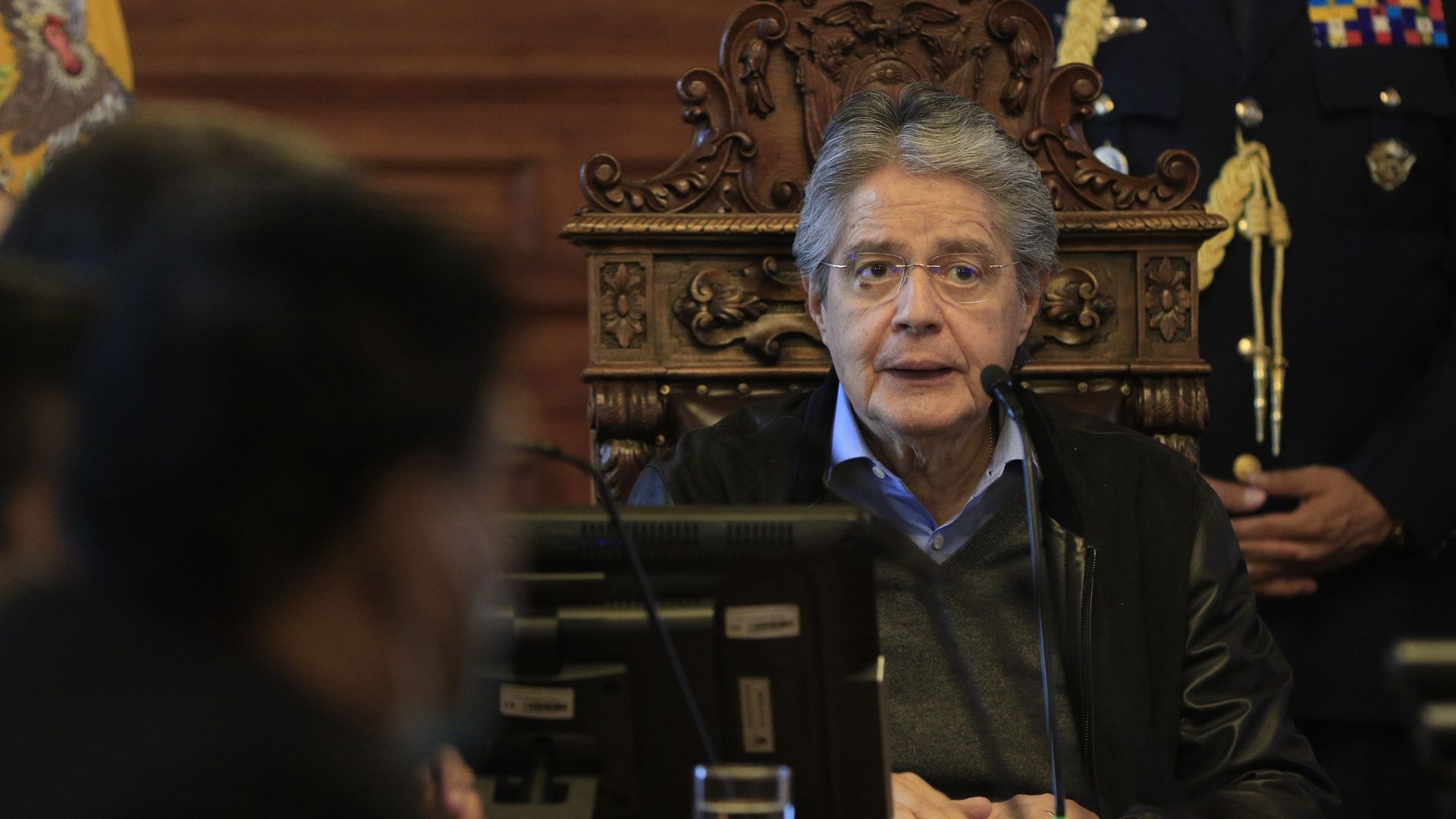 | | | Giullermo Lasso. Photo: Franklin Jacome/Agencia Press South/Getty | | | | Ecuador's interests are best served by "balanced" relations with the world's two superpowers, President Guillermo Lasso told Axios in a wide-ranging interview today on the sidelines of the General Assembly. Flashback: One year ago, Lasso's ambassador to Washington told Axios that U.S. indifference was forcing Ecuador and other Latin American countries to turn to Beijing. - "China is waiting, saying, 'We're here. We're giving you money.' They want control of course, but they don't say that," Ambassador Ivonne Baki had said.
Yes, but: Lasso, who traveled to Beijing in February to renegotiate Ecuador's debt to China and seek a trade deal, said he's never felt any undue pressure from Beijing and trusts President Xi Jinping's promise that China will never place conditions on the relationship. - Lasso hopes to finalize the trade deal with China by the end of this year, and he insists he's not giving up his hopes of a free trade agreement with the U.S., which has shown little interest.
- "As the president of a country that is part of Latin America, I hope that the president of the United States will pay more attention to Latin America, of course I do," Lasso said.
- But he did highlight areas of cooperation with the U.S., particularly on drug trafficking. He recently proposed a referendum that would allow drug suspects to be extradited to the U.S., among other measures. "We cannot fight this [drug trafficking] alone, we need help from the U.S.," he said.
The big picture: Lasso took office in May 2021 as Ecuador's first conservative president in two decades, and he was initially highly popular thanks to a successful vaccine rollout. - But parts of the country were paralyzed over the summer by protests against Lasso, initiated by Indigenous groups — in particular the Confederation of Indigenous Nationalities of Ecuador (CONAIE) — and triggered by the rising cost of living.
- Gang violence has also spiked. Lasso, who controls only a small fraction of the national assembly, survived an impeachment vote in June, but remains under significant political pressure.
- Lasso railed against CONAIE in our interview, claiming that the group's demands for more environmental protections around oil drilling were irreconcilable with its insistence that the government increase fuel subsidies.
- The subsidies are already costing the government more than it spends on education or health care, Lasso said. He has attempted, largely unsuccessfully, to slash them as part of a deal with the IMF.
- CONAIE has blasted Lasso's steps to deal with soaring prices as insufficient.
The bottom line: Ecuador is one of many countries struggling with high debts and rising prices coming out of a devastating pandemic-related downturn. - "We will continue our work," Lasso said of trying to get the country onto sounder economic footing, "but we cannot change our circumstances from one day to the next."
- He called for more concrete actions from the U.S., EU and other industrialized countries to support smaller, lower-income countries like Ecuador.
|     | | | | | | 3. Global news roundup | 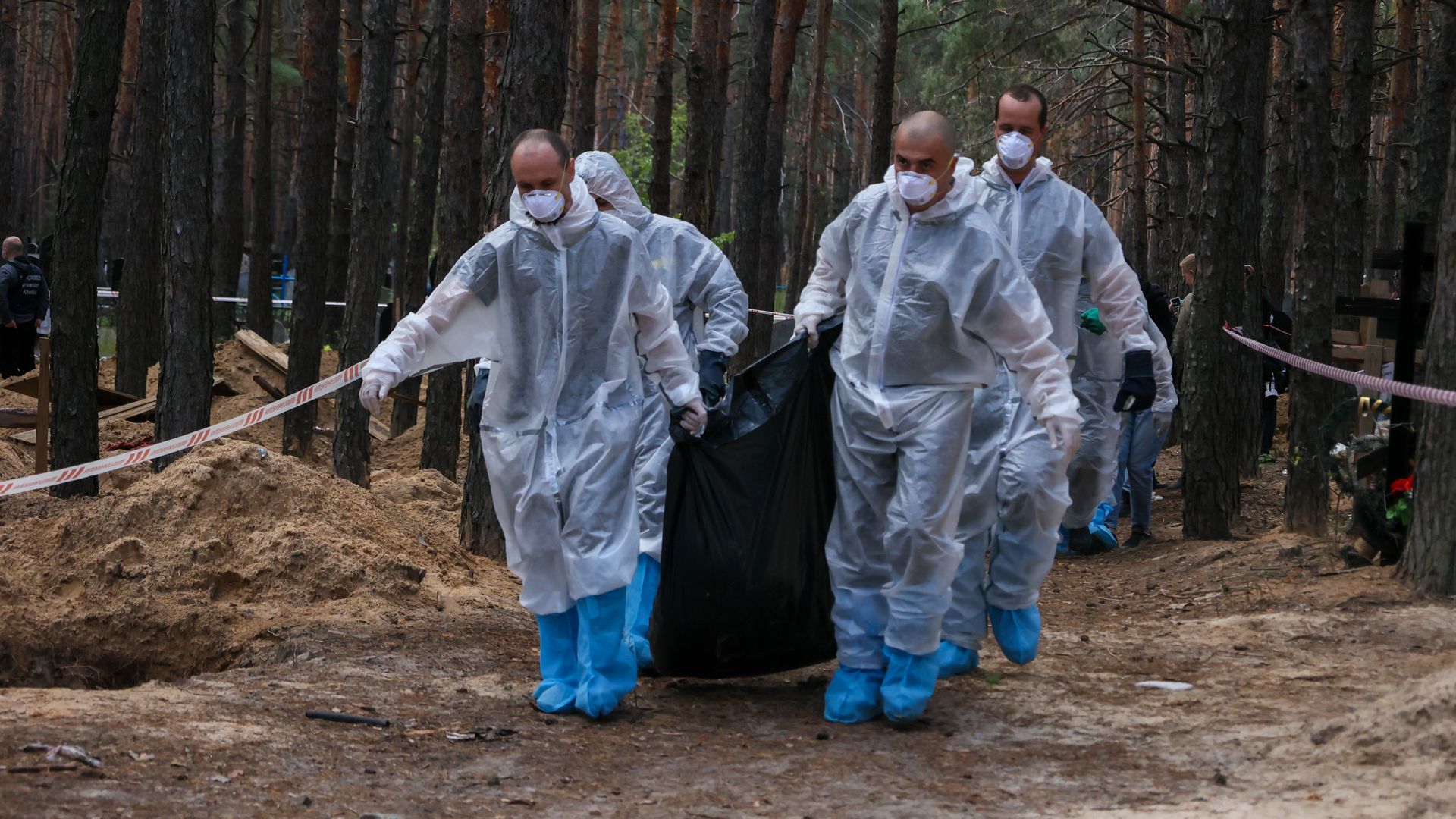 | | | Bodies are exhumed from mass graves in Izyum, Ukraine. Photo: Stringer/Anadolu Agency via Getty Images | | | | 1. Ukrainian officials say 146 bodies, including two children, have been exhumed from a mass grave near the newly liberated city of Izyum. - The latest: Ukraine continues to gain territory in its northeastern offensive. President Biden told "60 Minutes" that Ukraine was defeating Russia" and that victory would mean expelling all Russian troops from Ukrainian territory.
2. In the same interview, Biden again vowed that American forces would defend Taiwan if China's military invaded the self-governing island. - Between the lines: The White House again stressed that U.S. policy hasn't changed, but there was no "strategic ambiguity" in Biden's statement that he would send troops in the event of an "unprecedented attack."
3. U.S. Navy veteran Mark Frerichs, who was kidnapped in Afghanistan two years ago, was released today by the Taliban in an exchange with Afghan drug kingpin Bashir Noorzai. - Why it matters: Frerichs was the last remaining American known to be held hostage in Afghanistan, and the Biden administration said he must be released if the Taliban wanted deeper relations with the U.S.
4. At least 94 people were killed in border clashes between Kyrgyzstan and Tajikistan that began last Wednesday. A fragile cease-fire seemed to hold over the weekend, with Russian President Vladimir Putin mediating between his two allies. - On the ground: More than 137,000 people were evacuated from border areas in Kyrgyzstan due to incursions and shelling by Tajik troops, per Eurasianet.
5. El Salvador's authoritarian President Nayib Bukele announced that he would ignore a constitutional ban and seek re-election. |     | | | | | | A message from Global X ETFs | | Reasons to consider a covered call strategy | | | 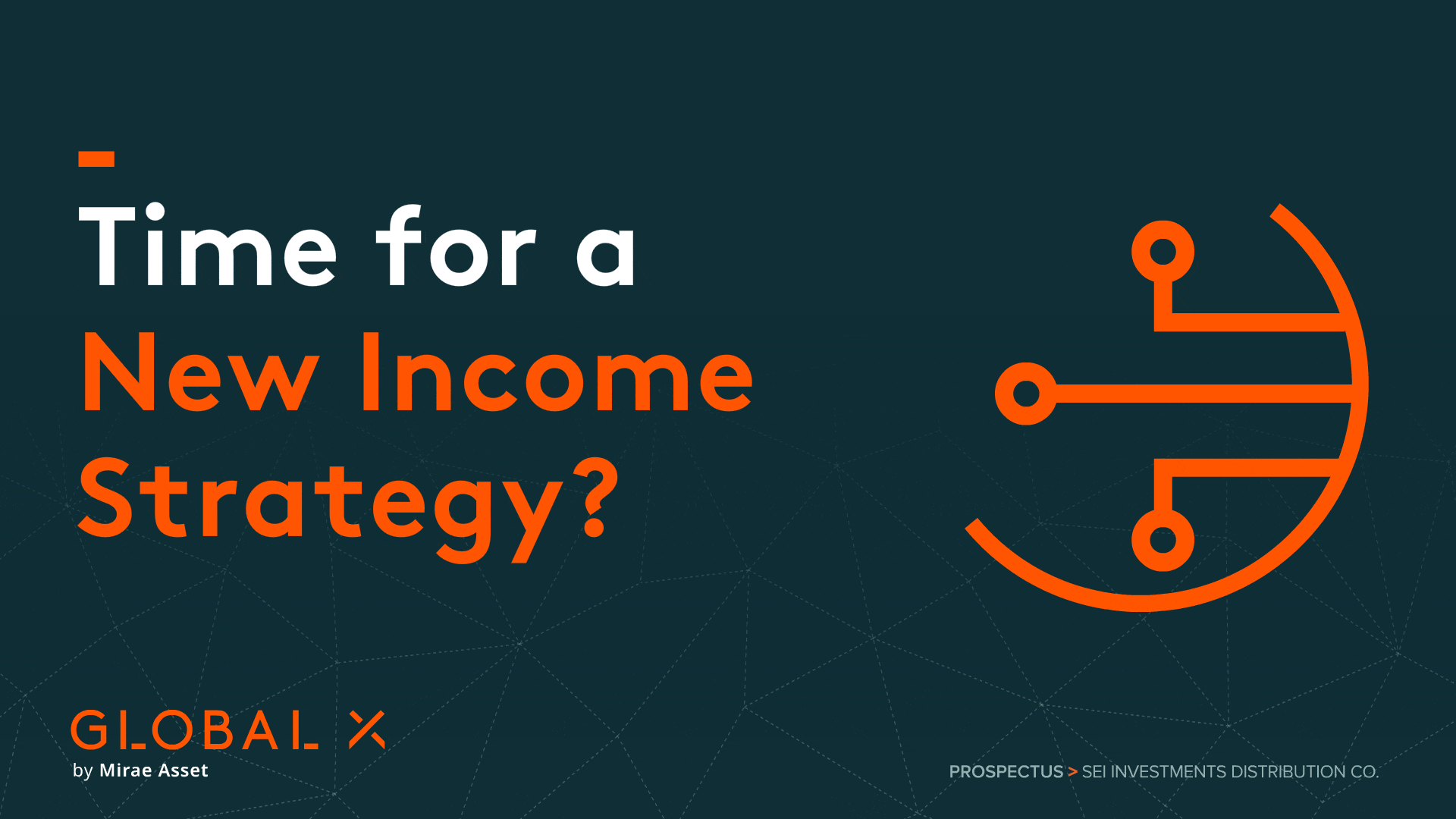 | | | | Seeking to retain equity exposure while mitigating downside risk? The time could be right for covered call strategies. Navigate volatile markets with the Global X Nasdaq 100 Covered Call ETF (QYLD) — it writes call options on the Nasdaq-100 Index, aiming to generate monthly income. Explore QYLD. | | | | | | Bonus: Where in the world? | 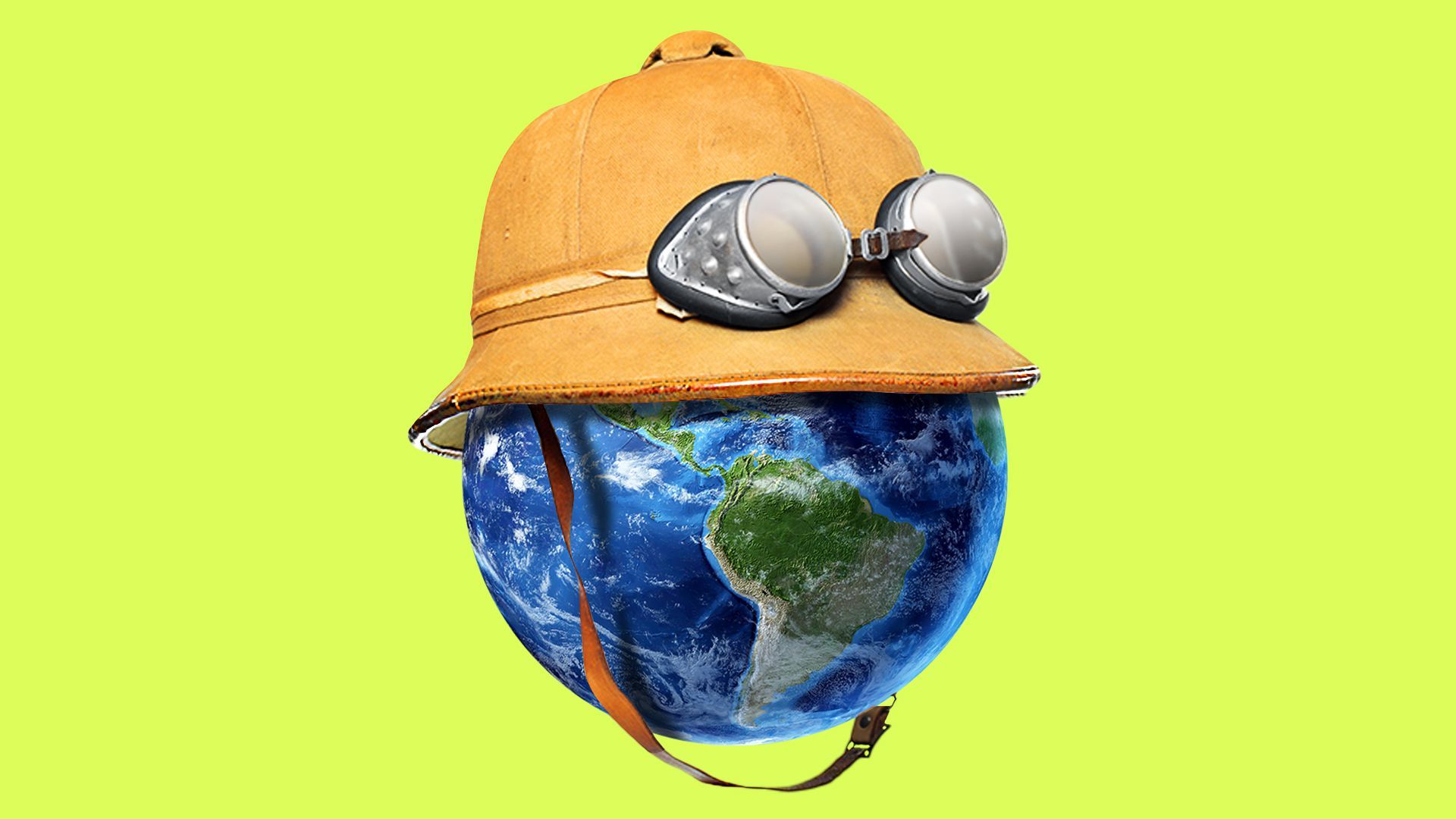 | | | Illustration: Natalie Peeples/Axios | | | | Today's quiz marks the transition in the British monarchy. I'll give you a country and you tell me whether King Charles III is now its head of state. - Canada
- India
- Bahamas
- Barbados
- Antigua and Barbuda
- New Zealand
- Kenya
- Zimbabwe
- Fiji
- Papua New Guinea
Bonus: In which of these countries has the prime minister already promised a referendum on whether to ditch Charles as monarch? Go deeper: What's next for King Charles III and the Commonwealth countries |     | | | | | | 4. Queen Elizabeth II laid to rest | 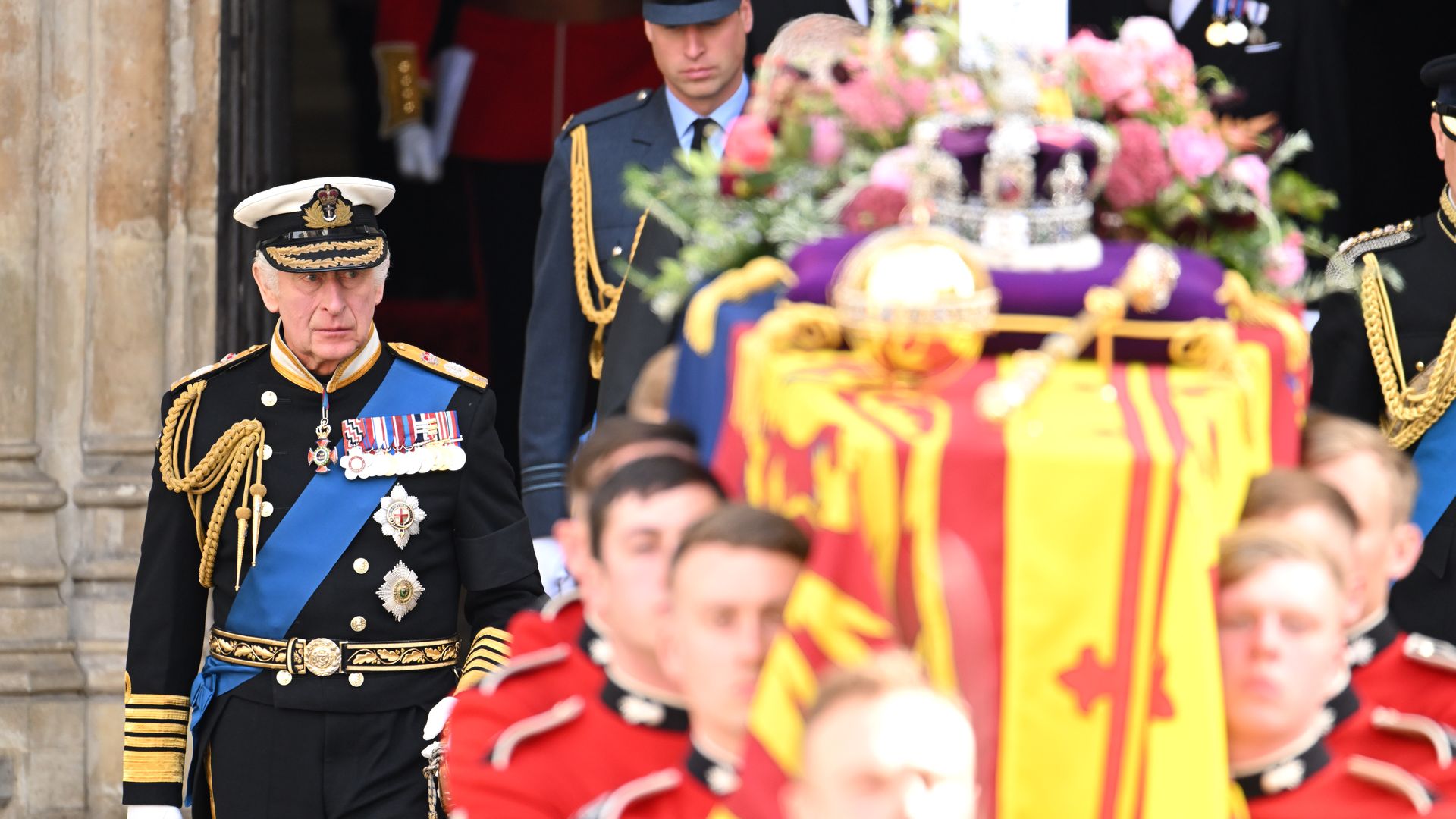 | | | The late queen and her successors. Photo: Karwai Tang/WireImage | | | | Some 500 foreign dignitaries, including President Biden, attended Queen Elizabeth II's funeral today at Westminster Abbey. - Hundreds of thousands of spectators lined the streets, and the line to view her coffin over the weekend stretched for 5 miles.
- The queen's coffin was transported to Windsor Castle to be buried next to her late husband, Prince Philip.
- The state funeral, the U.K.'s first since Winston Churchill died, included a countrywide moment of silence that lasted for two minutes.
In photos. |     | | | | | | 5. Italy's next prime minister? |  | | | Giorgia Meloni rallies supporters in Rome. Photo: Nicolò Campo/LightRocket via Getty | | | | The latest polls ahead of Italy's Sept. 25 general election show a hard-right coalition on track to win a clear majority in both houses of parliament. What to watch: That puts Giorgia Meloni, who leads the Brothers of Italy, in pole position to become prime minister. Her coalition also includes the League, led by far-right firebrand Matteo Salvini, and former Prime Minister Silvio Berlusconi's Forza Italia. - Meloni, who would be Italy's first female PM, is seeking to reassure EU leaders that she'd govern as a center-right pragmatist, stand by Ukraine, and spend EU recovery funds responsibly.
- Yes, but: She has a history of praising far-right leaders like Hungary's Viktor Orbán, and her party has fascist roots. It's a matter of debate whether her front-runner status says more about her own drift to the center or the Italian public's willingness to vote for the extremes.
- Flashback: Technocratic Prime Minister Mario Draghi's coalition collapsed in July, forcing the early election.
Go deeper: Italian politician's threat highlights dangers Europe's Roma face |     | | | | | | 6. One fun thing: Cheetahs return to India | 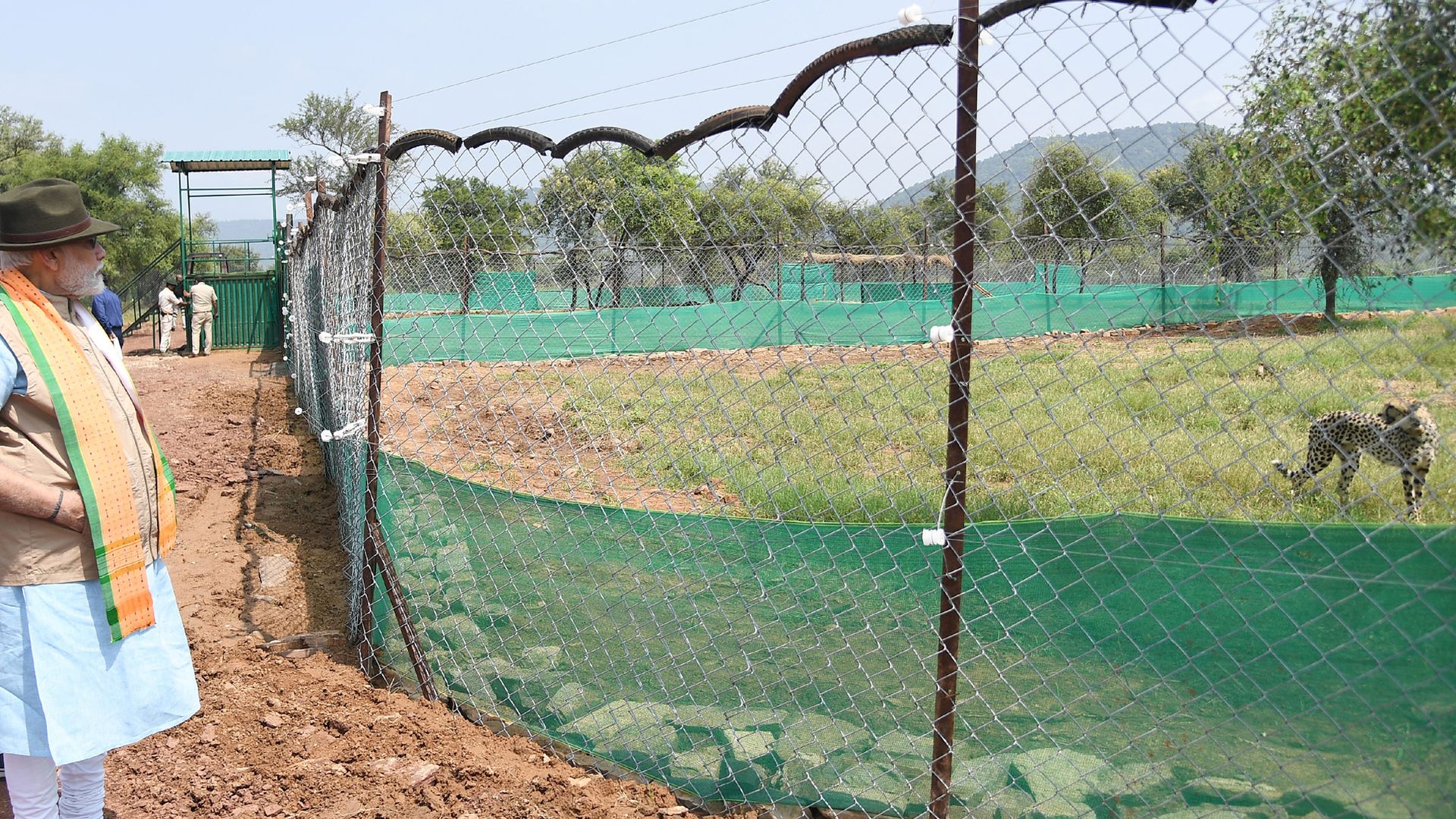 | | | Prime Minister Narendra Modi inspects the new arrivals. Photo: Press Information Bureau/Anadolu Agency via Getty Images | | | | Cheetahs went extinct in India 70 years ago. As of Saturday, they're back. How it happened: Namibia, which is home to a third of the world's remaining 7,000 cheetahs, sent an initial eight cats to mark Indian Prime Minister Narendra Modi's birthday. More will soon be on the way. - "When the cheetah will run again … grasslands will be restored, biodiversity will increase and eco-tourism will get a boost," Modi said, per AP.
- If the cheetahs thrive in their new environment — in a large national park — it could ensure the survival of the world's fastest land mammal. But experts also warn that there could be unforeseen consequences.
|     | | | | | | 7. Stories we're watching | 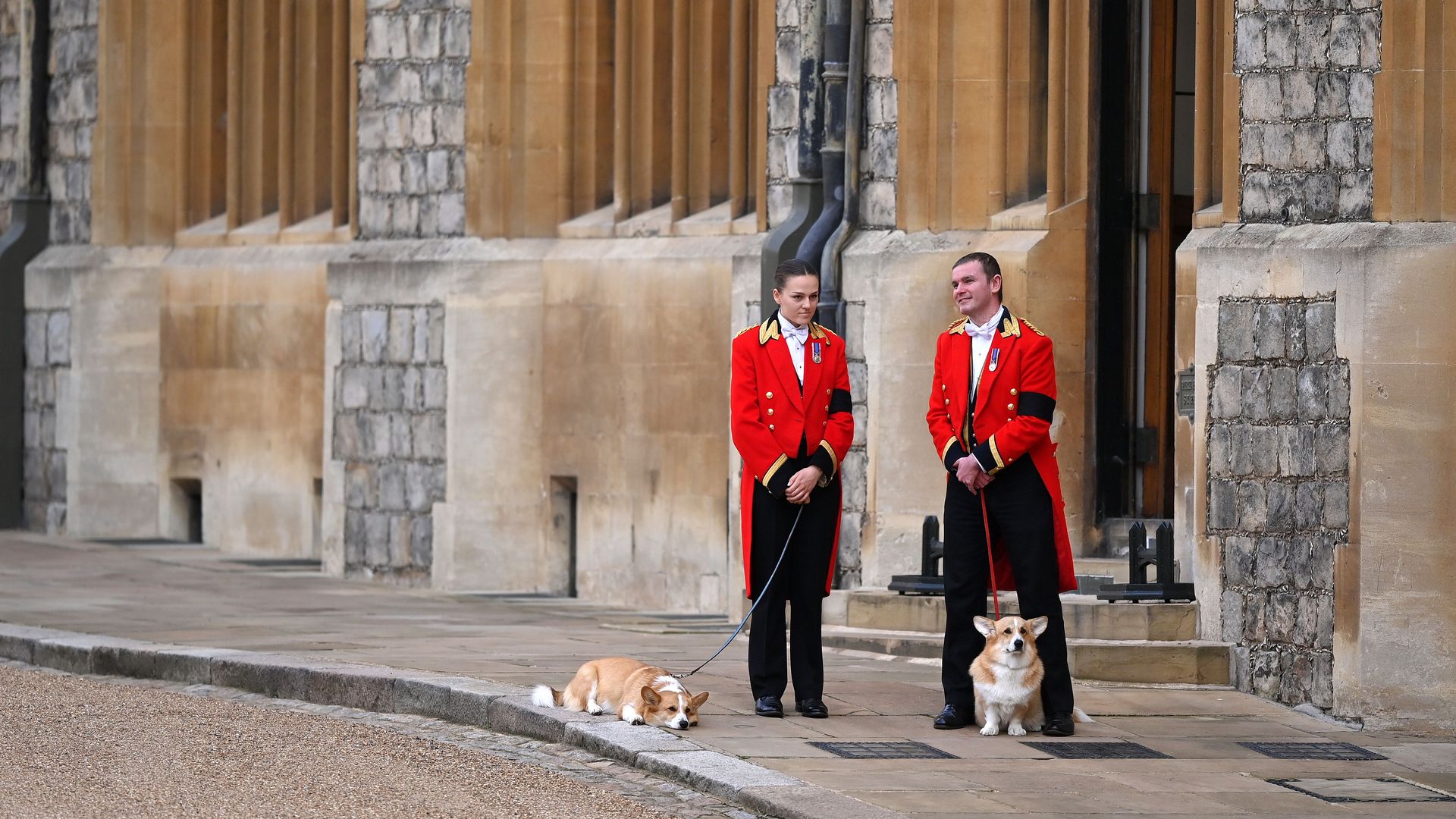 | | | Members of the royal household walk corgis near the funeral service at Windsor Castle. Photo: Justin Setterfield/Getty Images | | | - Mexico issues tsunami warning after magnitude 7.6 quake
- Taiwan sees "widespread damage" from 6.8-magnitude quake
- Putin: "We aren't in a rush" in Ukraine
- U.S. sends aircraft carrier to Korea for joint navy drills
- U.S. base targeted in failed rocket attack in Syria
- Xi and Putin hold first meeting since Ukraine invasion began
- EU envoy says he's being snubbed by Israeli leaders
Quoted: "The deaths of our boys for illusory goals ... make our country a pariah and weigh heavily on the lives of its citizens." — Alla Pugacheva, a beloved Russian singer, in perhaps the most high-profile rebuke of the war thus far to come from inside Russia. |     | | | | | | A message from Global X ETFs | | Reasons to consider a covered call strategy | | |  | | | | Seeking to retain equity exposure while mitigating downside risk? The time could be right for covered call strategies. Navigate volatile markets with the Global X Nasdaq 100 Covered Call ETF (QYLD) — it writes call options on the Nasdaq-100 Index, aiming to generate monthly income. Explore QYLD. | | | | Answers: 1. Canada, Yes; 2. India, No; 3. Bahamas, Yes; 4. Barbados, No; 5. Antigua and Barbuda, Yes; 6. New Zealand, Yes; 7. Kenya, No; 8. Zimbabwe, No; 9. Fiji, No; 10. Papua New Guinea, Yes. Bonus: Antigua and Barbuda |  | | Are you a fan of this email format? It's called Smart Brevity®. Over 300 orgs use it — in a tool called Axios HQ — to drive productivity with clearer workplace communications. | | | | | | Axios thanks our partners for supporting our newsletters. If you're interested in advertising, learn more here.
Sponsorship has no influence on editorial content. Axios, 3100 Clarendon Blvd, Arlington VA 22201 | | | You received this email because you signed up for newsletters from Axios.
Change your preferences or unsubscribe here. | | | Was this email forwarded to you?
Sign up now to get Axios in your inbox. | | | | Follow Axios on social media:    | | | | | |













No comments:
Post a Comment